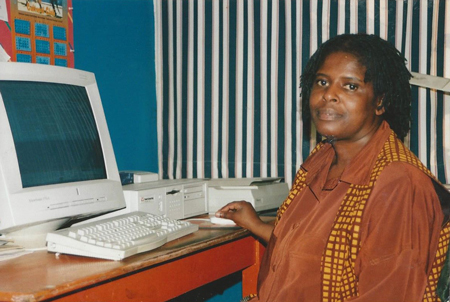
26.03.21
The womb is a big girl
Joyce Jenje-Makwenda
Joyce Jenje-Makwenda
“The womb is a big girl, she doesn’t talk about what she eats.” Joyce Jenje-Makwenda shares knowledge on African tradition and a woman’s role regarding family and her own body. In this episode we learn about a community that takes care of the woman and respects her own needs in the family context. Also, we unveil forms of thinking about family and relationships that don’t erase the self but engage obligations, freedom and sexuality; and how these structures as well as language were impacted by colonialism and western Christian religion. The concept of love is here shaped by African knowledge systems and views not as opposition to other possible concepts but by considering the specificities of African ways of expressing love. The role of gifts, sex, touch, the meaning of proverbs and how love grows are just many of the themes we discuss.
Joyce Jenje-Makwenda is a journalist, producer and performing artist. She is an independent scholar, archivist, historian, researcher, author, lecturer and ethnomusicologist with more than thirty years of experience covering areas of early urban culture, music, politics, education, religion, media, fashion, sex, sexuality, cultural issues and women’s histories in Zimbabwe.
As a writer, Jenje-Makwenda has written a number of books and novels, including Zimbabwe Township Music (2005), Gupuro (2006) in Shona and English, USenzeni (2007) in Ndebele Zulu, both books on women’s issues and the girl child respectively. In 2013 she published Women Musicians of Zimbabwe 1930’s to 2013: A Struggle for Voice and Artistic Expression, and in 2015 she released sequels: Women in Film in Zimbabwe: Modern Storytellers, Women Writers and Poets in Zimbabwe: The power of the written and spoken word and Zimbabwean Women in Theatre, Drama and Comedy: An Artistic Way of Communicating. She has produced and directed several documentaries on music.
She established the Joyce Jenje-Makwenda Collection Archives, a private social history archive located at her house in Harare, hosting materials such as video and audio interviews on music, transcriptions, press cuttings, photographs, vinyl LPs and artifacts, that include instruments, gramophones and typewriters for scholarly and historical purposes.
![]()
Joyce Jenje-Makwenda is a journalist, producer and performing artist. She is an independent scholar, archivist, historian, researcher, author, lecturer and ethnomusicologist with more than thirty years of experience covering areas of early urban culture, music, politics, education, religion, media, fashion, sex, sexuality, cultural issues and women’s histories in Zimbabwe.
As a writer, Jenje-Makwenda has written a number of books and novels, including Zimbabwe Township Music (2005), Gupuro (2006) in Shona and English, USenzeni (2007) in Ndebele Zulu, both books on women’s issues and the girl child respectively. In 2013 she published Women Musicians of Zimbabwe 1930’s to 2013: A Struggle for Voice and Artistic Expression, and in 2015 she released sequels: Women in Film in Zimbabwe: Modern Storytellers, Women Writers and Poets in Zimbabwe: The power of the written and spoken word and Zimbabwean Women in Theatre, Drama and Comedy: An Artistic Way of Communicating. She has produced and directed several documentaries on music.
She established the Joyce Jenje-Makwenda Collection Archives, a private social history archive located at her house in Harare, hosting materials such as video and audio interviews on music, transcriptions, press cuttings, photographs, vinyl LPs and artifacts, that include instruments, gramophones and typewriters for scholarly and historical purposes.
Joyce in 1999 (Photo: courtesy of Joyce Jenje-Makwenda Collection Archives)
